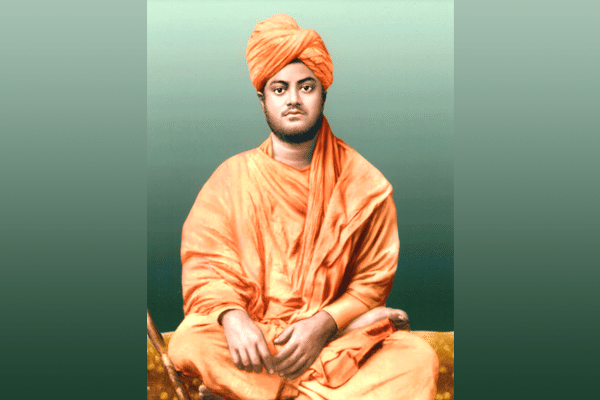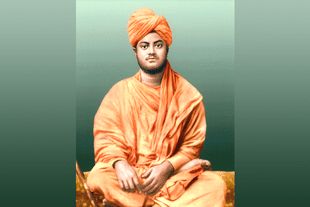Magazine
Vivekananda Is To Spirituality What Einstein Is To Modern Physics
David Frawley
Sep 11, 2018, 11:42 AM | Updated 11:42 AM IST
Save & read from anywhere!
Bookmark stories for easy access on any device or the Swarajya app.


Swami Vivekananda’s famous talk at the World Parliament of Religions in Chicago in 1893 was monumental on several levels, not all of which have been properly understood. His was an epoch making revival and global expansion of Yoga, Vedanta, Hinduism and India as part of a single profound message for all humanity. He represented India’s vast ancient dharmic civilisation in a modern rebirth, renewal and transformation that continues to the present day.
Vivekananda started the modern world Yoga movement, which people in the West most identify him for. His Yoga-Vedanta teachings quickly spread throughout North America and Europe, and became the basis for the new experiential spirituality of the modern age. His work pioneered a new study of consciousness and self-realisation along with yogic practices of asana, pranayama, mantra and meditation, and yogic ways of healing. He made Yoga appealing to both science and spirituality, including cosmology, psychology, medicine and philosophy – taking it far beyond the old constricting boundaries of religious discourse.
What Albert Einstein did for modern physics introducing the theory of the relativity of time and space, Vivekananda did to spirituality, taking it out of the boundaries of conversion-based creeds to an inner science of consciousness beyond time, space and person. He introduced a cosmic vision of Yoga and Hinduism as complementary to the vaster, new view of the universe modern science was discovering.
The success of Vivekananda in the West helped revive the Yoga-Vedanta tradition in India, as well as tantra and deity worship, with his guru Ramakrishna Paramahansa a devotee of the Goddess Kali. He emphasised a universal tradition of dharma behind all the religions and sciences of the world, rooted in India. Hindu Dharma that had been consigned to superstition and backwardness by the colonial mind suddenly presented itself as one of the most innovative and visionary movements on the planet.
Vivekananda restored the ancient image of India at spiritual, philosophical and cultural levels and countered the colonial assault, including the massive effort to convert India and suppress Indic culture that was reeling under siege at the pinnacle of colonial rule. Vivekananda’s teaching formed the intellectual and spiritual mooring for the Indian independence movement that was just starting, providing it an inspiration and foundation in India’s traditions going back to the Gita and Upanishads.
Vivekananda travelled and spoke as a Hindu monk — dressed in orange, with a turban, eloquently explaining and defending Hindu Dharma to a Western public, print media and academia, including religious groups that were imbued with harsh missionary stereotypes and denigrations of India and Hinduism. India, like Africa at the time, was viewed as one of the last primitive frontiers to be conquered to spread the civilising message of Christianity. The amount of prejudice and defamation that Vivekananda faced was enormous, occurring at an era in which black people in America were still lynched for the colour of their skin, and most people had never seen a Hindu from India, much less hear one speak.
Vivekananda’s Influence Today
Global Hinduism began with Vivekananda, in whose footsteps numerous Hindu gurus followed to visit or reside in the West. Wherever Hindus have migrated in the world, Vivekananda’s work and promotion of Yoga and Vedanta have provided them an identity worthy of respect.
Even today, Vivekananda’s teachings remain at the cutting edge in all spheres of learning and culture and are worthy of profound examination and deep research. Yoga teachers in the West would greatly benefit from studying Vivekananda’s teachings to understand the exalted origins of the Yoga teachings that they have scaled down to mere physical models.
Most notably, Vivekananda was a youth of 30 years, boldly by himself taking on a massive cultural assault on India’s profound traditions. He demonstrated how one awake and aware individual, rooted in the self, can change the world. We need many more new Vivekanandas today, East and West, for humanity to awaken from its modern spiritual slumber and arise to its timeless truth.
In 2018, Hindus again are gathered in Chicago, 125 years after ji’s transformational discourse. They have become a prominent and successful diaspora in the United States and other Western countries. Beautiful Hindu temples can be found in major cities throughout the world. India as a nation has been independent for more than 70 years and is once more affirming its dharmic heritage under Prime Minister Narendra Modi. Numerous Hindu gurus are active, teaching on every continent.
Yet harsh criticisms against Yoga, Hinduism and India remain, though no longer from such a dominant position as a century ago. Hindus realise that they can be proud of their traditions, follow their gurus and yogic teachings, and be as successful and innovative as any other group in the world.
The world has come a long way since Vivekananda broke the ground on the new era of experiential spirituality, but still has far to go. The courage, daring and intelligence of the young Vivekananda still lights the way forward, not only for India but for all humanity. Yet anti-Hindu distortions in America’s media and academia continue. Hindus are challenging these today but must work diligently to remove them entirely.
Vivekananda’s work is not finished, though it has created an unshakeable foundation on which to grow. Let us follow his example and bring the light of Sanatana Dharma to all, to uplift every noble aspect of human knowledge and
culture.
David Frawley is an American Hindu teacher and author. He has written more than 30 books on the Vedas, Hinduism, Yoga, Ayurveda and Vedic astrology.





